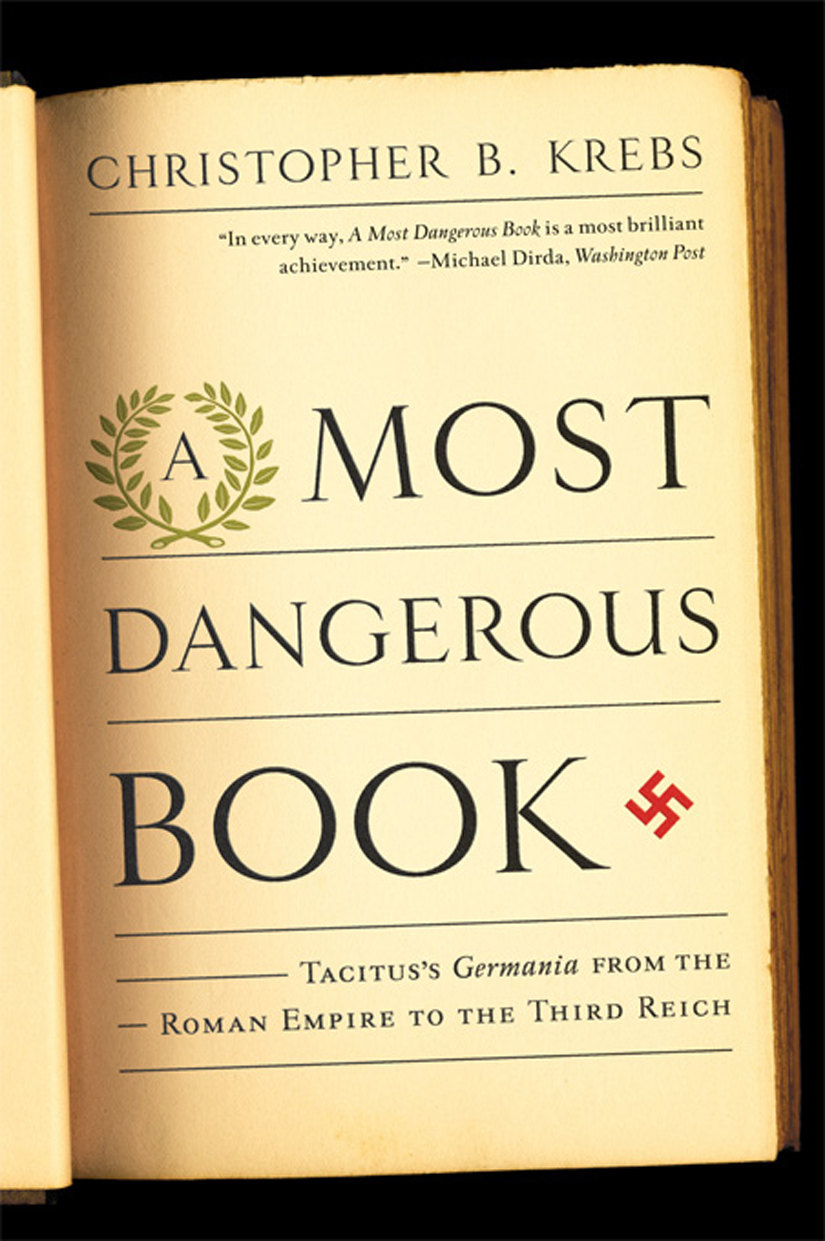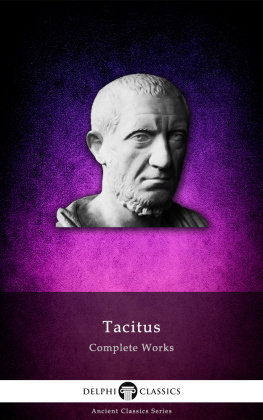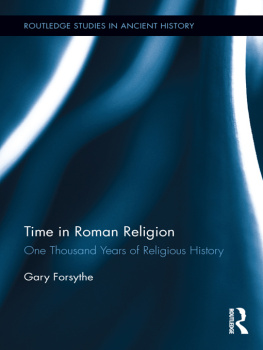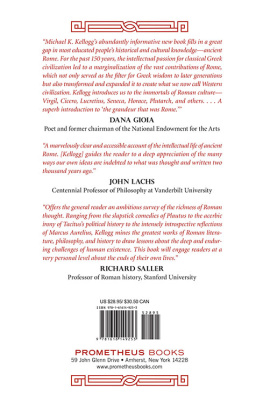
A MOST DANGEROUS BOOK

T ACITUSS Germania
FROM
THE R OMAN E MPIRE
TO
THE T HIRD R EICH

Christopher B. Krebs


W. W. NORTON & COMPANY
New York London
Copyright 2011 by Christopher B. Krebs
All rights reserved
First published as a Norton paperback in 2012
For information about permissions to reproduce selections from this book, write to Permissions, W. W. Norton & Company, Inc., 500 Fifth Avenue, New York, NY 10110
For information about special discounts for bulk purchases,
please contact W. W. Norton Special Sales at
specialsales@wwnorton.com or 800-233-4830
Manufacturing by Courier Westford
Book design by Brooke Koven
Production manager: Devon Zahn
Library of Congress Cataloging-in-Publication Data
Krebs, Christopher B.
A most dangerous book : Tacituss Germania from the Roman
Empire to the Third Reich / Christopher B. Krebs. 1st ed.
p. cm.
Includes bibliographical references.
ISBN 978-0-393-06265-6
1. Tacitus, Cornelius. Germania. 2. Group identityGermany
I. Title.
PA6706.G4K736 2011
936.302dc22
2010049425
ISBN 978-0-393-34292-5 pbk.
eISBN 978-0-393-06296-0 epub.
W. W. Norton & Company, Inc.
500 Fifth Avenue, New York, N.Y. 10110
www.wwnorton.com
W. W. Norton & Company Ltd.
Castle House, 75/76 Wells Street, London W1T 3QT
1 2 3 4 5 6 7 8 9 0
To my father,
Rudolf Bodo Jrgen Krebs,
on his seventieth birthday
CONTENTS
ILLUSTRATIONS
The reproduction of any illustrations is not permitted without the explicit permission of the copyright holder.
Mosaic in the entrance hall of the Villa Fontedmo, C. B. Krebs 2009, courtesy of Giovanni Baldeschi-Balleani.
Codex Aesinas, Vittorio Emanuele 1631, c. 66r. Biblioteca Nazionale Centrale di Roma.
Funerary inscription of Tacitus (Museo Nazionale Romano, Rome), Livius.org, 2008.
Woodcut of Poggio Bracciolini (13801459): Jean-Jacques Boissard, Icones quinquaginta virorum illustrium, doctrina & eruditione prstantium... cum eorum vitis descriptis (Frankfurt, 159799), 108. Houghton Library, Harvard University, Typ 520 97.225.
Noahs son Tuysco, the German primogenitor: Giovanni Nanni (Annius of Viterbo, 14321502), Commentaria super opera diversorum auctorum de antiquitatibus loquentium (Rome: Silber, 1498), piv. Houghton Library, Harvard University, Inc 3888.
Tuisco, the father of all Germans: Johannes Turmair (Aventinus, 14771532), Chronica, darinn nicht allein dess alten Hauss Beyern... Herkommen, Stam vnd Geschichte... , sondern auch der uralten Teutschen Ursprung, Herkommen, Sitten, Gebrauch, Religion, Mannliche und treffliche Thaten... beschrieben (Frankfurt: Feyerabend, 1580), iir. Houghton Library, Harvard University, Ger 9250.3.1.
A Germanic feast: Philipp Clver (15801622), Germaniae antiquae libri tres (Leiden: Elzevier, 1616), 158. Houghton Library, Harvard University, GC6 C6275 616g.
Germanic farmer: Justus Mser (172094), Osnabrckische Geschichte, in Smmtliche Werke , vol. 5 (Berlin: F. Nicolai, 1798), frontispiece. Widener Library, Harvard College Library, 47528.1.10.
SS runes: Cover of Photo Album B in the Himmler collection, Hoover Institution Archives.
Facial angle: Peter Camper (172289), The Works of the Late Professor Camper (London, 1821), Tab. vi. Boston Medical Library in the Francis A. Countway Library of Medicine,
fNC760.C15.
Cephalic index: Hans F. K. Gnther (18911968), Rassenkunde des deutschen Volkes (Munich: J. F. Lehmann, 1922), 28. Widener Library, Harvard College Library, Ger 330.435.
Masthead of the Alldeutsche Bltter: Mitteilungen des Allgemeinen Deutschen Verbandes 10 (1900), March 4. Center for Research Libraries, MF 10155.
Photograph of Heinrich Himmler (190045), from 1931/32: Heinrich Himmler Papers, Album A, Hoover Institution Archives.
Tacitean Motto of a Hitler Youth manual: Horst Wagenfhr, GefolgschaftDer germanische Kampfbund (Hamburg: Hanseatische Verlagsanstalt, 1935), motto. Widener Library, Harvard College Library, KD41701.
ACKNOWLEDGMENTS
Many are those who have in one way or another helped to make this book come about.
First and foremost I would like to thank my teachers, sincerely and belatedly. I was fortunate to learn Latin at an early age, at first inspired by Elke Steinkrau at elementary school (Grundschule am Weinmeisterhorn), then challenged by Walter Fietz at high school (Kant Gymnasium). There I also, somewhat naively, signed up for ancient Greek under Elisabeth Krauses guidance. When after a break from the classical languages I returned to studying them at university, I realized the depth of my debt. Even though English came last in my curriculum of languages, I had the good luck of receiving Gabriele Ziganns (now Tapphorn) instruction, which would eventually allow me to study in England and to live and work and write in the United States. In other areas my indebtedness is similarly profound: I would have walked a lot less sure-footedly through 450 years of European history if I had not visited much of the territory before during many years of history lessons. Education should not be a privilege; but I feel very privileged.
It has also been my privilege to work more recently at two excellent libraries, the Harvard College Library, with Widener and its marvelous open shelves at its center, and, for almost a year, at the Bayerische Staatsbibliothek in Munich. Researching the impact of Tacituss Germania involved browsing a great number of books, journals, and other documents, published over centuries in places far and wide, and these two libraries either counted the texts I needed among their respective collections or secured them through their smoothly running interlibrary loan systems. I feel particularly grateful to the staff at Widener and Houghton (Harvards library for rare books and manuscripts): For no matter how obscure or rare the document I was interested in and no matter where I turned for help, I met only with cheer and competence. Other institutions that speedily met my requests for information or documents include the Archiv des Erzbistums Mnchen und Freising; the Hoover Institute; the Bundesarchiv Koblenz; the Bundesarchiv Berlin; the Biblioteca Nazionale Centrale di Roma; the Ufficio Turismo: Comune di Jesi; and the Ufficio Informazione e Accoglienza Turistica in Osimo.
Walking through Wideners stacks in search of references to and quotations from Tacituss most dangerous book , I ventured repeatedly into areas outside my expertise. I am grateful for the guidance I received from the following: Giovanni Baldeschi-Balleani on the history of his family and the Codex Aesinas; Dr. Michael Carhart (Old Dominion University) on Christoph Meiners; Professor Andreas Gardt (University of Kassel) and Dr. Nicola McLelland (University of Nottingham) on seventeenth-century linguistic theories; Professor Roger Chickering and Bjrn Hofmeister (both Georgetown University) on the Alldeutsche Bltter . Particular thanks are due to Dr. Brian Vick (Emory University), who not only helped with various eighteenth- and nineteenth-century issues but also read and copiously annotated two of my chapters, and to Dr. Allan A. Lund as well as Heather Pringle for their generous help and careful readings of my chapter on National Socialism.
Next page













